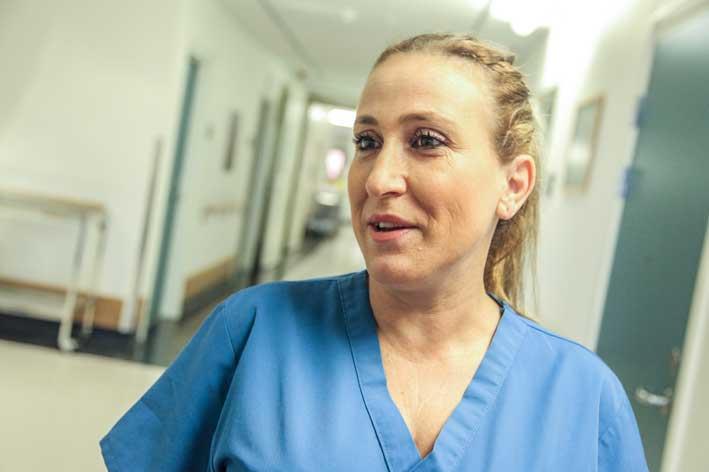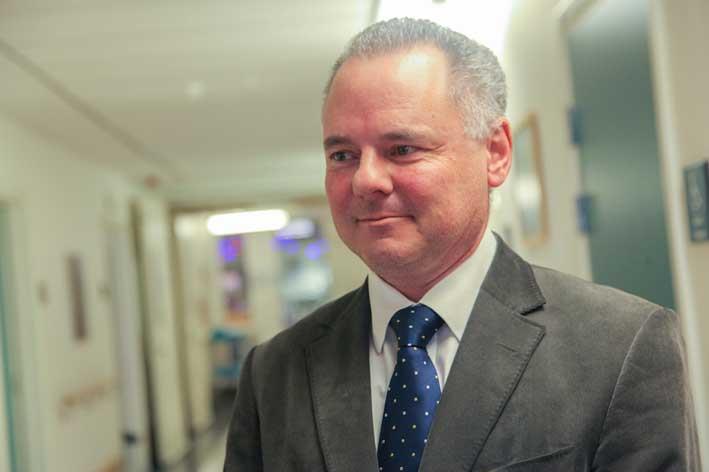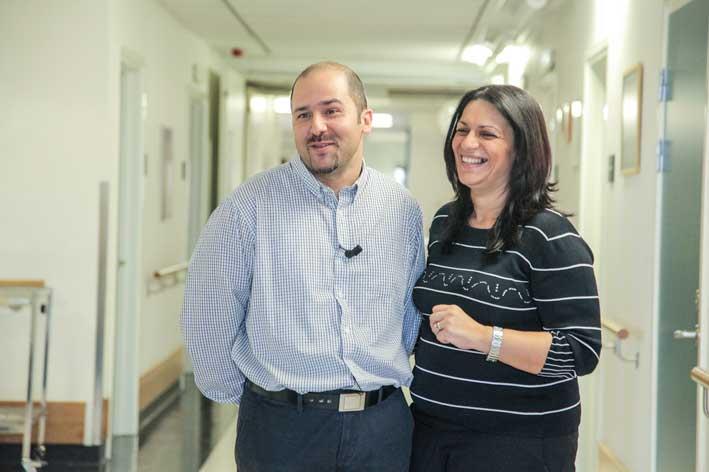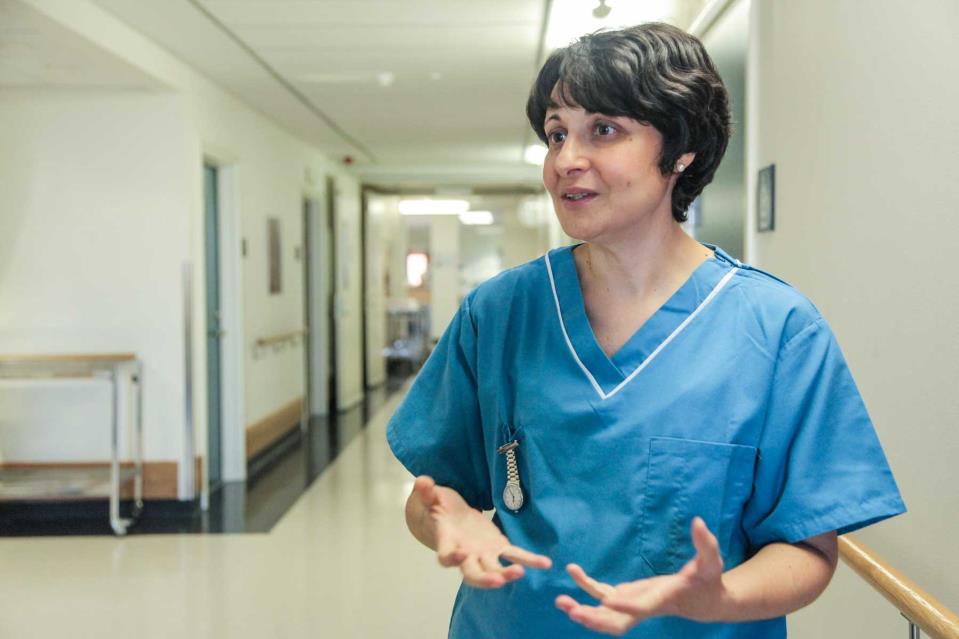The Neonatal Paediatric Intensive Care Unit (NPICU) treats babies and children aged three and under, who require extensive treatment and constant monitoring. The patients are admitted to this ward from the Emergency Department, from Paediatric Wards, from Obstetric Wards and from operating theatres. The NPICU does not only cater for premature babies but also for little ones who require medical attention or who are victims of accidents.

Grieving the loss of a child
Isabelle Bartoli has worked as a nurse in the NPICU for the past eight years. Before that, she worked in the adult's Intensive Treatment Unit (ITU) for 15 years.
"Each patient's story is different and particularly challenging in its entirety, because if the baby is admitted to the NPICU, it only means he or she is not well enough to be home. But seeing a young human being passing away is something else."
Isabelle recalls one particular case. "One New Year's Eve, a baby was born in the 26th week of pregnancy, obviously very premature. We took all measures, despite the fact that we had little faith that he would actually make it. It was my duty to assist both the parents and the child. The child passed away at 7pm. That evening, I met my friends to celebrate the New Year, but as soon as the clock struck midnight, I remembered dressing the baby after he died and thought of how unhappy the parents must be, and started crying."
In a separate case, a young girl was scheduled to visit the United Kingdom for treatment, however shortly before that her condition deteriorated and she was admitted to the NPICU. There was no hope, and the medical team knew the young girl was not going to make it. Isabelle recalls being in the room when the bad news was passed on to her parents. "Both parents crumbled to the floor crying. It was extremely difficult; and I had to contain my emotions and provide my support."
"In contrast to patients at the NPICU, adults in the ITU are well aware of the situation and of medical procedures. Adults have memories of the past but they stop planning ahead for the future. But then again, we need to confront parents- day in and day out; we need to be there, supporting them, while taking care of their little ones.
"The ITU on the other hand is more stressful. There are mothers, fathers and siblings, and the occasional cry out of "Ma, tmutx (Mum, don't die)."

Chances of survival are high
Premature births are a common problem at the NPICU and mostly respiratory.
"Pregnancy lasts 40 weeks and if a baby is delivered well before the 40 weeks, he is not old enough to breathe on his own. When the NPICU is informed that a preterm baby is about to be delivered, the staff gather at the operating theatre so that once born, we start taking intensive care of him, keeping him warm and ensuring the required oxygen is being taken in. Once the baby is stable, we take him to the NPICU, and continue treatment in this ward," explains Dr Paul Soler, Chairman of the Paediatric Ward.
A baby delivered 24 weeks into the pregnancy has a 50 to 60 per cent chance of living, but it's a different story for those born before that. In Malta, babies of 23 weeks have survived, but these are the exception. The chance of survival increases to 90 per cent once a baby exceeds the 27-week period. The majority of these go on to live without further complications throughout their lives. The NPICU has a high success rate but some parents are not so lucky. "In this case, we keep in touch with parents, and assist them through the grieving process."
In the Intensive Care Unit, the medical team takes care of babies who have the most difficult symptoms in the country, as this is the only ward which offers such services. The patients require the expertise and dedication of paramedics, nurses, radiographers and surgeons.
"We do not only take care of the young ones, but also their parents and siblings, despite the stress level being particularly high in this unit," continues Dr Soler. "We also need take care of our own staff to ensure that we remain physically and mentally stable."

Parents' perspective
Tanya and Aronne are parents to two boys - a six year old, and a two-week-old baby. In both cases, the babies needed the assistance of the NPICU.
Six years ago, Jamie was born when Tanya was 32 weeks pregnant. Tanya was still at work on the morning she gave birth, and would never have imagined that by the evening she would have already delivered her baby.
"The service given at the NPICU is top class; members of the medical team take care of the children as if they were their own, and constantly provide assistance to the parents, explaining procedures in a simplified manner."
In her second pregnancy, Tanya also gave birth at 32 weeks. "I must admit that the second time round, the experience was less difficult because we were familiar with the surroundings and procedures."
Jamie still hasn't met his little brother, because children are not allowed in the NPICU. "Of course this time round it's different as we have our elder child to look after. The support of our relatives and friends is indispensible. The staff at the NPICU have become our second family. They do not only care for the babies, but give them the love babies require at that tender age. From time to time we take Jamie to meet his 'second mummies' at the ward. We want to publicly thank the staff at Parent Craft, Ops Unit and NPICU."

Managing the NPICU ward
Charlene Psaila is in charge of the NPICU ward.
"It is extremely challenging to manage such a ward, because it is an intensive treatment unit." Each day, Charlene must make sure that the ward is adequately furnished with the required equipment.
"Things are made easier because we work well together as a team. The parents are also part of the team - they give us the boost needed to strive harder. Almost every day we do not have enough staff - but we always manage to make it work. Someone is always ready to lend a hand."
"Unfortunately, we have patients who are here for much longer - sometimes even a year. We go through the ups and downs with the parents and families. We do not work with machines, but with human beings. We also require medical help ourselves- especially after traumas in the ward - to ensure our physical and mental well being."
"Very often people have the perception that it's all fun and games working with babies - but it's also difficult, as well as emotionally challenging."